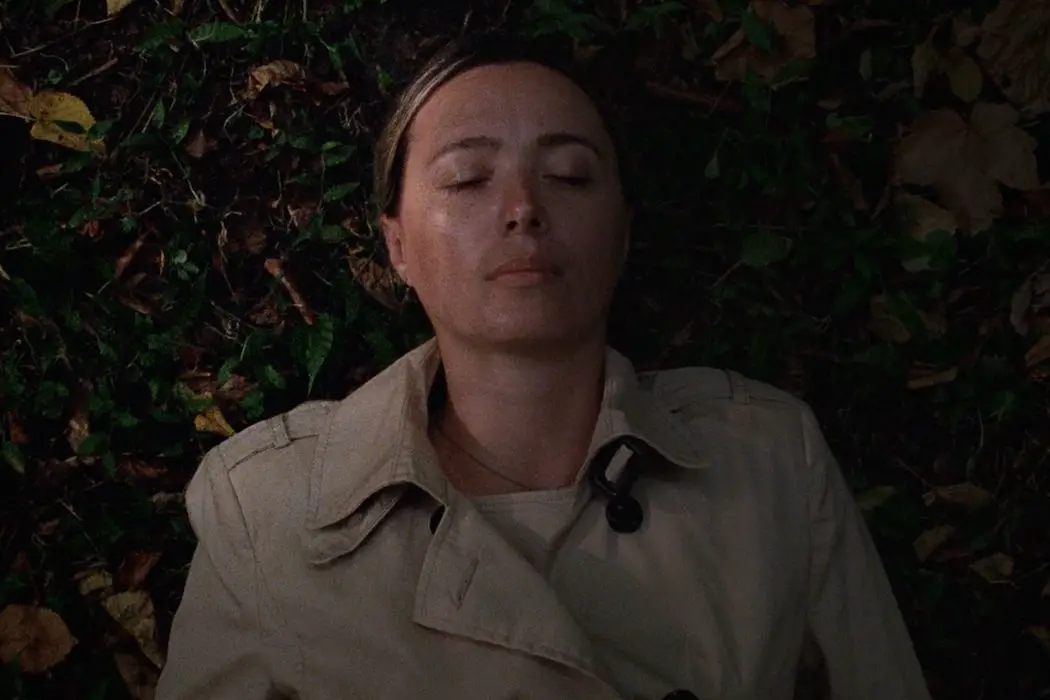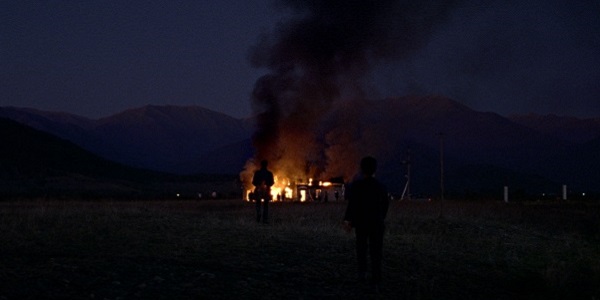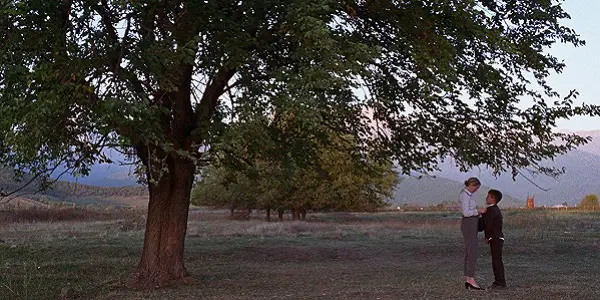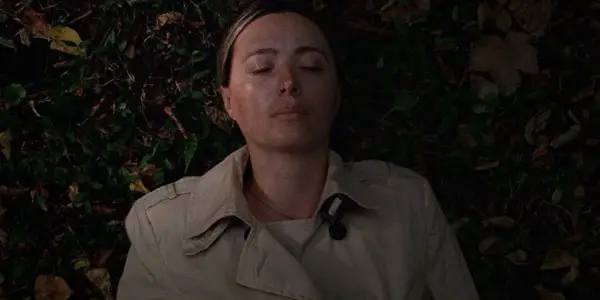NYFF 2020: BEGINNING: The Triumphant Debut of Déa Kulumbegashvili

Lee Jutton has directed short films starring a killer toaster,…
Winner of the Golden Shell for Best Film at this year’s San Sebastián International Film Festival, and chosen as Georgia’s entry for the Academy Award for Best International Film, Beginning signals the arrival of a bold new cinematic voice in the form of writer-director Déa Kulumbegashvili — though, as you watch it, it’s hard to believe you are watching a feature debut, so bold and confident is the storytelling. An intense examination of patriarchal oppression in both secular and religious society, anchored by a stellar lead performance and some of the most thoughtfully composed shots you’ll see this year, Beginning is guaranteed to linger uncomfortably in the back of your mind long after the end credits have rolled.
[Warning: this film contains depictions of sexual violence, which are referenced in this review.]Fire and Blood
The film doesn’t waste any time in flooring the viewer, beginning with one wide shot that lasts nearly eight minutes as a service for Jehovah’s Witnesses begins in a small village outside of Tbilisi, Georgia. The leader of the congregation is David (Rati Oneli, who co-wrote the script with Kulumbegashvili), aided by his faithful wife, Yana (Ia Sukhitashvili), who was trying to make it as an actress before she met and married her husband and devoted herself entirely to him and his religious mission.
The service seems to be going according to plan when suddenly the door of the congregation’s Kingdom Hall is thrown open and someone throws a torch into the building. The flames spread in the foreground of the frame as the worshippers panic in the background, stumbling over each other to flee the burning building. By the time the fire has been put out, the hall has been destroyed.

The fire is blamed on right-wing extremists who are angry over the arrival of the Jehovah’s Witnesses in their community and have been harassing David and Yana for quite some time; it is implied that this is not the first act of violent vandalism their Kingdom Hall has suffered. Yet when David reports the incident to the local police, he is urged to withdraw the complaint — otherwise, he is warned, something worse might happen. And when a local detective (Kakha Kintsurashvili, the third of the film’s trio of writers) visits Yana while David is away on business, the sexual harassment she endures from someone who is supposed to be protecting and serving the community is sinister in the extreme.
Despite being urged to ask her husband to withdraw the complaint, Yana doesn’t even tell David about the visit. What happens next is an act of sexual assault made even more horrific by the fact that it takes place in one painfully long take, shot from far enough away to provide some distance from what is happening while also making one feel uncomfortably like a voyeur. From there, Yana spirals further down into an existential crisis, questioning her role in her marriage, her community, and her faith, all the while preparing her young son and several other children for their baptism as though nothing on earth is wrong.
A Woman’s Worth
Beginning is by no means an easy watch; for women, especially those who have suffered some of the horrors that Yana does over the course of the film, it will likely be even more difficult to endure emotionally, a slow and painful burn. Indeed, despite the traumatic events I have already described, for large swaths of Beginning not much happens at all. Instead, we follow and watch Yana attempt to go about life as usual despite feeling deep down as though things will never be the same, all the while feeling a sense of dread in our stomachs that grows heavier and more solid as the film progresses.

At one point, David tells her, “I want to forgive you.” Yana’s blunt response: “You won’t be able to.” David keeps expressing a desire to start anew in both their marriage and their religious mission, proposing that he take a job at headquarters in Tbilisi so they can escape the claustrophobic and closed-minded community they are currently in. However, rather than immediately agree with him, Yana is reluctant to commit, lacking the conviction that it is possible to begin again after everything she has been through. And when David, in a fit of rage, argues that she is attempting to sabotage his career and claims that without him, she’d be only a failed actress, it’s easy to see why Yana has stopped harboring any hope things can get better. Even in her own home, a supposedly safe space, the persecution of the patriarchy abounds.
As previously noted, the film is brilliantly shot and edited, courtesy of director of photography Arseni Khachaturan and editor Matthieu Taponier, in a way that only further heightens the anxiety that runs through the film. Many of the shots last several minutes, including one particularly eerie moment where Yana lies on the ground in the park, playing dead as her son attempts to wake her. The camera rarely moves; when it does, it is usually because it is stationed in a moving car, making the audience feel as though we are riding in the passenger seat.

Beginning is shot in a tight aspect ratio of 4:3 that forces one to appreciate everything within the frame, yet the camera is often placed at a distance from the action, as though trying to avoid too much intimacy with the characters. At the same time, characters will frequently enter the frame from the front, crossing forward from behind the camera, giving the audience the feeling that we too are present in the scene, albeit as silent watchers who are unable to act. It’s a strange contradiction, but one that entirely suits the film.
While the camerawork may seem to be the star of Beginning, that accolade actually belongs to Ia Sukhitashvili, whose performance as Yana is remarkably subtle but no less sympathetic for it. While she might be attempting to hide what she’s going through from those around her, we know better, which makes watching her drill children about the nature of hell in their baptism classes all the more painful. “Hell is when you burn in fire,” one child chirps, and indeed, from the film’s beginning to its shocking end, one can see the flames licking away at Yana’s entire world.
Conclusion
Beginning is one of the most powerful feature debuts in recent memory, and wholly deserving of all of the plaudits that have come its way as it makes the rounds of the international festival circuit.
What do you think? Are you familiar with Georgian cinema? Share your thoughts in the comments below.
Beginning is screening as part of the Main Slate at the 2020 New York Film Festival.
Watch Beginning
Does content like this matter to you?
Become a Member and support film journalism. Unlock access to all of Film Inquiry`s great articles. Join a community of like-minded readers who are passionate about cinema - get access to our private members Network, give back to independent filmmakers, and more.
Lee Jutton has directed short films starring a killer toaster, a killer Christmas tree, and a not-killer leopard. Her writing has appeared in publications such as Film School Rejects, Bitch: A Feminist Response to Pop Culture, Bitch Flicks, TV Fanatic, and Just Press Play. When not watching, making, or writing about films, she can usually be found on Twitter obsessing over soccer, BTS, and her cat.













